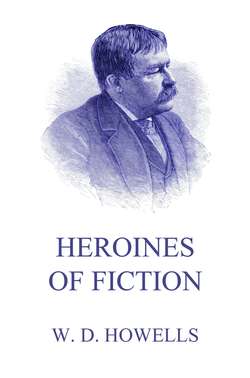Читать книгу Heroines Of Fiction - William Dean Howells - Страница 32
На сайте Литреса книга снята с продажи.
I
ОглавлениеI do not know what measure of favor the recent London and Boston editions of Miss Ferrier's novels have met with; but I think the reader can find an uncommon pleasure in them if he will first thoroughly advise himself that they are no such works of art as Jane Austen's stories. Miss Ferrier was one who caricatured and satirized and moralized; and yet her fiction is largely true, with delightful instances in which it is altogether true. In fact, any author who aims at truth to his own knowledge of what is just and right, can hardly fail of truth in portraying life. His conscience governs him in his art, his conscience becomes his art; and the two work together to an issue at once ethical and aesthetic.
Nearly every character in "Marriage," which we may agree upon for the time as Miss Ferrier's best story, has some touch of the amusing eccentricity, the lawless originality, which afterwards in much eviler times developed into the excesses of Dickensosity. But her people are not merely eccentrics or originals; and one remembers them for their qualities as well as for their singularities. Lady Juliana Courtland, who makes a runaway match with Henry Douglas, and who, when cast off by her father, goes with her lapdogs and parrots to find a home with her husband's family in the Scotch Highlands, is only a super-accentuated expression of the weak, shallow, persistent selfishness of which the best society in all times and countries offers abundant examples. But she is skillfully differenced from other examples of the kind, and she passes through the story quite visibly and tangibly. The three old-maid sisters of the laird of Glenfern are eccentrics, without the inconsistency which distinguishes characters; they are as infallibly themselves as so many lunatics. Their devoutly admired Lady MacLaughlin, with her medicines and all her maxims, is also a type, inflexibly consistent, but capable of variation from her rude prepotency, in favor of the supercilious triviality of the English earl's daughter, who promptly tramples the obsequious pride of the poor ladies of Glenfern under her silk-shod feet. She is a true aristocrat in the unfailing assertion of her superiority, and they are true aristocrats in their acknowledgment of it. When her captivity in the abhorred Highlands comes to an end through the good offices of that old friend of her husband's who manages Douglas's recall to his regiment, and makes him an allowance, she gladly leaves one of her twin daughters behind her with the sister-in-law who adopts it; and with insolent exultation before her husband's family, she goes back to the spendthrift life in London from which her mistaken love-marriage had exiled her. She is studied in bold "black and white; and there is little shading used or needed in the portrayal of her growth from a selfish young woman of fashion into a selfish old woman of fashion.
One of the prime virtues with which an aristocracy supplies itself at the expense of the lower classes is frankness; and the frankness with which Lady Juliana and all her noble family discover their good and bad traits is shown with perhaps more mastery than anything else in the story. Her niece, Lady Emily, is rather a pleasing accident of the kindly patrician willfulness, such as Thackeray was fond of imagining; but neither she nor Lady Juliana's spoiled daughter Adelaide, nor her neglected daughter Mary, is the heroine of "Marriage." That is always Lady Juliana herself, who grudges letting Mary come to her for a few months, when the girl's health is failing in Scotland, as shamelessly as she refuses following her husband to India when his regiment is ordered away. She has never in her whole selfish life had a doubt of her right to the things she enjoys wasting, and has never had a regret except for a pleasure she has missed. She grows older very naturally; her caprice becomes obstinacy, her willfulness severity, her levity foolishness; she screeches, she scolds, she makes herself a bore and a nuisance. She is truly the incarnation of the meretricious spirit, and her instinct is to spoil and devour, to crave and to grudge.
